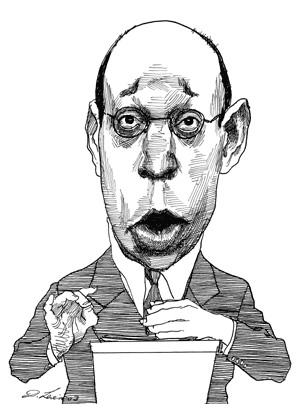As we have been instructed at regular intervals since September 11, 2001, “they” attacked us because they hate everything we stand for, our freedoms most of all. If that is the case, history will have to explain why post-9/11 America was so quick to rein in the freedom of debate even as we paid constant self-congratulatory lip service to this moral distinction between them and us. September was not over before Ari Fleischer, the President’s press secretary, set the tone. “There are reminders to all Americans that they need to watch what they say, watch what they do, and this is not a time for remarks like that,” he said, commenting about a wisecrack by a late-night TV comic, Bill Maher, that had gone against the administration’s grain. Lest Fleischer’s own remarks prompt an unruly debate, history was rewritten for the public record; the official White House Web-site transcript of the briefing deleted Fleischer’s warning, an omission the White House later attributed to “a transcription error” (but took days to correct) after some reporters noticed it. It’s hard to imagine how those who “hate our freedoms” could have attempted this Orwellian sleight of hand with greater panache.
But in truth, it was not really necessary for Fleischer to issue his warning. The movement to marginalize or mock any quibbles, however slight, with administration wisdom, to minimize unwanted news that might reflect ill on the competence or motives of its leaders, was the nearly spontaneous reaction of the press and television, needing only a little nudge from the White House. It was a sign of the times that for months even the NBC corporate peacock donned the stars and stripes to serve the agreed-upon triumphal mood, should anyone question the old bird’s patriotism. When Condoleezza Rice warned that Osama bin Laden might be issuing encoded instructions to his minions through his al-Jazeera video manifestoes, most networks heeded her request to censor them, as if unexpurgated al-Jazeera wasn’t widely available to interested parties in the US by satellite anyway. Meanwhile, the administration’s law enforcement excesses and failures—the roundup of thousands of immigrants who had nothing to do with al-Qaeda, the inability to discover the source of the anthrax attacks—disappeared into the journalistic memory hole even faster than the White House’s bogus assertion that a credible threat against Air Force One had precipitated George W. Bush’s disappearing act on September 11.
And so what Joan Didion called the “fixed ideas” of our war on terrorism in her recent essay in these pages* was able to fall into place with scant resistance. The reassuring point of the fixed ideas was to suppress other ideas that might prompt questions or fears about either the logic or hidden political agendas of those conducting what CNN branded as “America’s New War.” Thus the President’s “moral clarity,” which led the dean of Washington political punditry, David Broder, to liken him to Lincoln, was beyond question: if he declared that “you’re either with us or you’re with the terrorists,” that surely had to be the case, and don’t look too closely at our allies Pakistan and Saudi Arabia. The moral bankruptcy of his few vocal critics was also a given. Tom Daschle, the Democratic leader who never seriously challenged administration policy after September 11 and ultimately signed on to the war with Iraq, was likened to Saddam Hussein in TV commercials run in his state. “How dare Senator Daschle criticize President Bush when we are fighting our war on terrorism?” asked Trent Lott, knowing his rhetorical question required no answer by right-thinking Americans.
The President, far from being the “moron” his most moronic adversaries claim, shrewdly capitalized on this atmosphere as the months piled up. This White House is famously secretive and on-message, but its skills go beyond that. It knows the power of narrative, especially a single narrative with clear-cut heroes and evildoers, and it knows how to drown out any distracting subplots before they undermine the main story. Just hours before the FBI agent Colleen Rowley was to testify about her agency’s catastrophic sloppiness in the weeks prior to 9/11, the White House abruptly announced its approval of a Department of Homeland Security, a Democratic idea it had previously fought. Rowley and her testimony soon disappeared from prominent view as the networks busily began publicizing the pro forma presidential address hastily assembled for prime-time airing that night.
The Iraq plot, in the works for months, was unveiled with all the care of a Hollywood holiday release. “From a marketing point of view, you don’t introduce a new product in August,” said Andrew Card, the chief of staff, in late summer 2002, when asked why his boss had prolonged the raising of the curtain. It was an honest answer. Besides, Iraq could not be allowed to distract from the happy story line of that moment, a televised forum in Waco, Texas, at which the President, his soon-to-be-fired economic team, and a gathering of campaign contributors told us to forget our post-Enron worries because relief was on the way. Though in fact no new economic policies were announced, that wasn’t the point. It’s the mise en scène that mattered: White House–produced backdrops emblazoned with legends like “Small Investors/Retirement Security,” designed to soothe channel surfers who did not linger to hear the latest variations on the administration’s unchanging tax-cut panaceas.
Advertisement
When Iraq was finally rolled out in earnest, it too drowned out some other, conflicting narratives. By mid-January 2003, according to a poll conducted for Knight Ridder by Princeton Survey Research Associates, half the country held the erroneous belief that one or more of the 9/11 hijackers were Iraqi citizens. Bin Laden and Mullah Omar, once prime evildoers, were retired from public discourse almost as completely as the TV series that long ago had prompted the President’s desire to apprehend them “dead or alive.” So was the lost battle of Tora Bora that hastened their escape. Forgotten too was a new Gary Hart–Warren Rudman task force report on the many weaknesses in domestic security post-9/11—much as their prescient pre-9/11 catalog of similar warnings had been forgotten before the attack. The fragility of post-Taliban Afghanistan and the huge burdens of shouldering a postwar Iraq, let alone the potential perils and costs (of all kinds) of the new war itself, went unmentioned as the President and his war managers repeated over and over that “time is running out.”
Time is running out, all right. To suggest that Colin Powell’s UN presentation could be an argument for further or perhaps permanent inspections rather than for an imminent invasion is to risk being caught “on the side of the terrorists,” or of Hitler’s appeasers, or, almost as seditiously, of the French. But North Korea and al-Qaeda, among other players, may not stick to the relatively quiescent roles they have been assigned in the administration’s plan for invasion. Wars rarely go according to script. The next stage of this one may determine just how many of our anesthetizing fixed ideas will stay intact and just how cruelly others will be ripped loose from their moorings.
—February 12, 2003
This Issue
March 13, 2003
-
*
“Fixed Opinions, or The Hinge of History,” The New York Review, January 16, 2003; to be published in book form as Fixed Ideas: America Since 9.11 by New York Review Books in April, with this essay as an introduction. ↩



